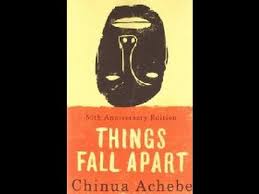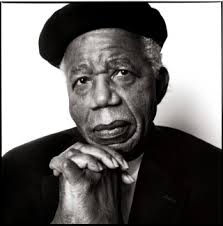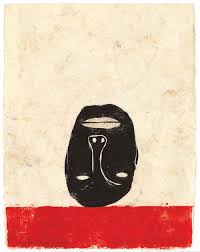"Thnings Fall Apart" by Chinua Achebe

In Things Fall Apart, Achebe is writing for an audience that does not fully comprehend the inner thoughts of an African village, but is intelligent enough to catch on quickly without much explanation, using his own home village as an example. Throughout the novel, different aspects of village life are told of, but Achebe doesn’t go in depth about them. He just grazes along the surface, like a ghost gliding through air.
On page 7, Okoye and Unoka are conversing when Okoye asks Ukona to return the two hundred cowries he had borrowed from him more than two years before. “As soon as Unoka understood what his friend was driving at, he burst out laughing. He laughed loud and long and his voice rang out as clear as the ogene, and tears stood in his eyes.” Following the word ogene, there is no mention of its definition. However, like the majority of the African words in the novel, with the exception of character names, it is italicized.
Italicizing the African words was Achebe’s way of distinguishing them from the English ones. He wanted the reader to take special notice of them. A possible reason he didn’t translate during the story is because he felt that translating them would diminish their meaning in the sense that they would be stripped of their African heritage and made English. Then there would be nothing special about them; they’d be just like all the other words.
There is also the possibility that this book was written for non-Africans. It seems as if Achebe wanted to somehow teach a history lesson of sorts with the story. Things Fall Apart is a novel about what can happen when changed is forced upon a community. At the time of the novel’s writing, the Cold War was taking place and the Soviet Union was trying to pressure poor countries into turning Communist. This book might’ve been a prediction of sorts as to what could happen if the Cold War continued.
When Achebe wrote this novel he probably wanted to portray how easily a community, no matter how close nit, can be changed. If this book wasn’t mainly about Okonkwo, but about this entire village, it could have the title the Commissioner decides to name the book he wants to write, The Pacification of the Primitive Tribes of the Lower Niger (p. 209). Umoufia represented all of the countries that were being converted to Communism, and the missionaries represented the Soviet Union.
Maybe Achebe knew his book would be read all around the world, and so created a story with a valuable lesson attached. No matter how high up you are, there is always someone or something more powerful that can knock you off your pedestal. Okonkwo was built up then torn down, just like that. He was a man “well known throughout the nine villages and even beyond. His fame rested on solid personal achievements” (p. 1). This man was like the people’s champion. They idolized him and gave him the utmost respect. And then “his body [was] evil, and only strangers [could] touch it” (p. 207).
A big possibility is that this book was written specifically for teenagers. This specific group of people is popularly known for having an invincibility complex. However, while this book was written about sixty years ago, it may be fair to assume that teens in the 1950’s behaved this way. Achebe was warning the youth of how dangerous it could be to assume that you are the best. This could be the purpose of the character of Nwoye. Okonkwo’s oldest son is to Okonkwo what Okonkwo was to his father: complete opposite. Okonkwo strived to be unlike his father. It’s possible that Nwoye was doing the same thing.
In our twenty-first century world, there are all kinds of things for teens to involve themselves in for the purpose of rebellion. In 1890’s Africa, there’s not much. This is where the Christian missionaries came in. They provided Nwoye an escape from his father. They also provided something new, other than the traditions everyone was used to.
A case could be made for just about every group of people as to whom the book was written for, but the simplest way to look at it would be that Achebe wrote this book for everyone. Oscar Wilde once said, “Art is the most intense mode of individualism that the world has ever known.” The individualism in art comes not only from the creation, but the interpretation. Different people who read this book will think various things afterward. For example, some will feel that Okonkwo took the easy and cowardly way out by committing suicide. Others will feel that he did the honorable thing because he was refusing to live by the missionaries’ rule. It just depends on who is asked.
This novel is about fall from grace of a man who was almost godly. It was intended for an audience that would take the message, interpret it in their own way, and use it in their own lives. Achebe wanted to use this story as a way of using the past to help make a better future.
References
Achebe, Chinua. Things Fall Apart. Anchor Book, 1959. Print.
"Oscar Wilde." BrainyQuote.com. Xplore Inc, 2013. 15 September 2013. http://www.brainyquote.com/quotes/quotes/o/oscarwilde122358.html
Read more at http://www.brainyquote.com/citation/quotes/quotes/o/oscarwilde122358.html#DVVDB9WvTIClpvCv.99







